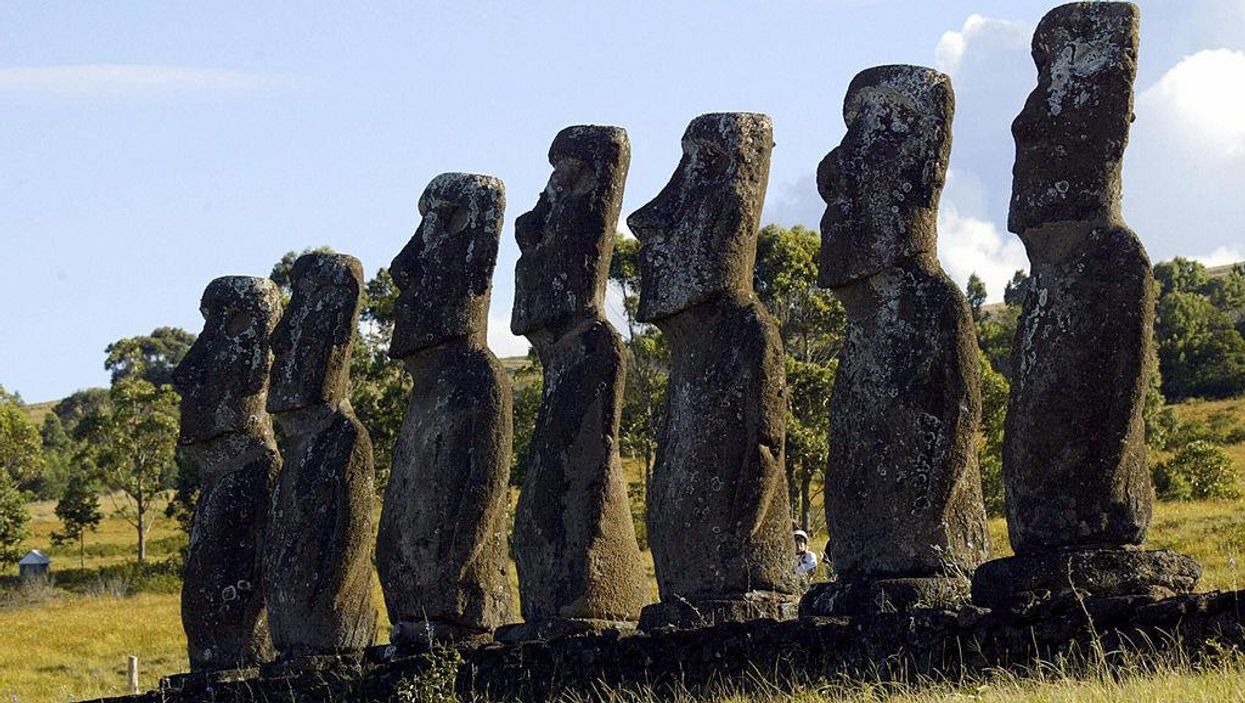News
Greg Evans
Jul 15, 2017

Picture:
AFP/Getty Images
There is nothing more intriguing than an ancient mystery, and they don't come much bigger than the disappearance of the inhabitants of Easter Island.
The Southeastern Pacific Ocean island, which is a territory of Chile, centuries ago boasted a thriving population - but in the 1860s they all suddenly vanished from existence.
The island, best known for its iconic stone heads, was home to the Rapa Nui people but little is known about them today.
There are many popular theories as to why these people died, ranging from disease and conflict to deforestation.
However, the most popular theory is that they managed to commit ecocide, which is when you destroy your natural surroundings so much so that it actually becomes unusable and eventually dies.
The story goes that the Rapa Nui people first settled on the island in 1200, after canoeing over from Polynesia, but by the time Europeans encountered them in the 18th century, large amounts of deforestation had already happened.
Fish was most likely the most common common source of food for the islanders and they would build canoes out of the trees. Yet, with a decreasing amount of trees to choose from, fishing from the ocean was no longer a viable option.
This then lead to the Rapa Nui relying upon food from the island but poor farming methods lead to soil erosion and agricultural decline.
However, new research has now potentially blown that theory out of the water.
A team from Bristol University, combining with work from the University of Hawaii and Binghamton University suggests that the evidence of the ecological collapse does not add up.
Their studies of the various botanical, human and faunal remains on the island lead the researchers to build up a greater understanding of what the islanders ate and how they farmed for their food.
We were able to paint an in-depth picture of what the ancient islanders ate, and in the process, learn about their agricultural methods
Catrine Jarman, the lead author of the study, told IFLScience.
This analysis revealed that the Rapa Nui people never stopped fishing as half of the protein in their diets came from marine life.
Carl Lipo of Binghampton University said in a statement on Newswise.
We found that there’s a fairly significant marine diet, over time, throughout history and that people were eating marine resources, and it wasn’t as though they only had food from terrestrial resources.
We also learned that what they did get from terrestrial resources came from very modified soils, that they were enriching the soils in order to grow the crops.
The Rapa Nui people were, not surprisingly, smart about how they used their resources. And all the misunderstanding comes from our preconceptions about what subsistence should look like, basically European farmers thinking, ‘Well, what should a farm look like?’ And it didn’t look like what they thought, so they assumed something bad had happened, when in fact it was a perfectly smart thing to do.
Therefore, these findings would indicate that there was no agricultural collapse and that the Rapa Nui people were actually quite good at farming.
Jarman added.
This also has wider implications as it allows us to reconsider how prehistoric populations interacted with their environment without relying on modern historic sources.
These revelations will now send researchers back to the drawing broad on this mystery, but don't place any bets on it getting solved anytime soon.
HT IFLSciene Wiley Online Library Newswise
More: These scientists have discovered an ancient mystery in the Amazon rainforest
Top 100
The Conversation (0)













